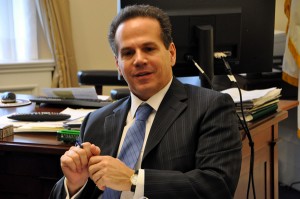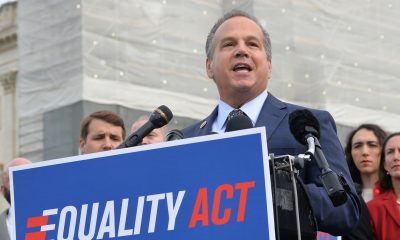National
Adjusting to freshman life on the Hill
Gay Rep. Cicilline on being in the minority, the prospects for a pro-LGBT omnibus bill — and D.C.’s social scene

As Rep. David Cicilline (D-R.I.) and his fellow House Democrats are discovering, being in the minority is rough.
The freshman lawmaker — and fourth sitting openly gay member of Congress — offers help to the best of his abilities to a group of disability advocates from his district, but knows his influence is limited with U.S. House Speaker John Boehner (R-Ohio) running the chamber and pledging to slash billions from government programs.
The Blade spent a day shadowing Cicilline last week. Six weeks into his first term as a member of Congress, he meets with about a dozen constituents working on disability issues in his office at the Cannon Office Building.
The meeting is one of four today for the Providence, R.I., mayor-turned-member of Congress, which is a typical load for Cicilline. Among his planned meetings is a talk with gay Rhode Island State House Speaker Gordon Fox, a leader in the fight to legalize same-sex marriage in the Ocean State.
But for this meeting, Cicilline listens intently as the advocates voice their concerns and hand him data sheets on problems facing the disabled and potential cuts to government programs.
Donna Martin, executive director of Rhode Island’s Community Provider Network, asks the lawmaker to push for continued funding for Medicaid programs through appropriations to the Department of Health & Human Services.
“The FMAP, the federal Medicaid match, the increased FMAP percentage is due to expire at the end of June,” she says. “That is going to have a tremendous impact on Rhode Island, specifically on our services. We are asking for consideration that those funds be extended until [health care reform] can be implemented — a provision in [health care reform] that expands the Medicaid safety net, if you will, which is active in 2014.”
Martin acknowledges that the Republican-controlled House doesn’t have “a whole lot of appetite” for talking about the extension of Medicaid funds, but emphasizes the importance of the program.
“It is a piece that has managed to keep many of these organizations afloat,” she says.
The disruptive noise of a loud conversation is heard from an adjoining room. Ever the attentive host, Cicilline rises from his seat to shut the door to his office.
Meanwhile, Jack Padien, CEO of Arc of Blackstone Valley, discusses the need for continued funds for the Department of Housing & Urban Development and Section 811 programs, which provide housing for low-income people with disabilities.
“The concern is, and I’m sure the concern with you and everyone else on the Democratic side, is that the Republicans have just put in a $63 billion cut — proposed cut — and that takes out a lot of things,” he says. “It would be devastating to take out $250 million out of a $300 million budget for low-income housing.”
Clad in a pinstripe suit, French cuffs and Italian loafers, Cicilline articulates his response in his distinctively raspy voice, starting with a comparison of President Obama’s fiscal year 2012 budget request to what the Republicans are proposing.
“If you look at the president’s budget — I mean, there are many things in that budget that I don’t agree with,” he says. “There’s some cuts in programs that I know are good programs, but the distance between the president’s budget and what the Republicans are proposing are just night and day.”
Cicilline cites figures that the Republican proposal would cost 80,000 jobs and, by comparison, says the president’s budget would be effective in reducing the deficit and spending while providing funds for infrastructure and education.
“It’s what families would use by tightening the belt by taking out the things that aren’t working and you don’t need, but also continue to invest in things that your family needs for its future security,” Cicilline says.
The freshman pledges to work hard to pass the president’s agenda in the House, but says he suspects Democrats won’t be able to accomplish that while being in the minority.
“It’s going to depend a lot on the role the Senate plays and how we stop some of this because I think the House Republicans are going to pass something, which, I think, everybody in this room would find really unacceptable,” he says.
As a final request, Cicilline asks for specific examples of how cuts proposed by Republicans would cost jobs or harm programs that rely on federal programs.
“We talk about it in public hearings — $2 billion we cut here or $5 billion here,” Cicilline says. “That much money? It should get cut. And I think to the extent that you can provide me, ‘Look if this program is cut in half, 25 less people will be enrolled in this service and we’ll have to close that,’ that would be very useful both in terms of making the case to other colleagues and also just describing to people back home what the consequences of the Republican budget would mean.”
The meeting concludes with a group photo of Cicilline and the Rhode Island constituents who sat in on the meeting. Staffer Brad Greenburg is poised to take the photo, although Cicilline has to remind him to remove the cap from the lens before hitting the flash button.
The theme of Republicans working to slash funds from programs while Democrats urge for continued appropriations is a common one lately.
On Tuesday, as the House debates a resolution to continue funds for the remainder of the fiscal year, Cicilline takes to the floor to denounce cuts Republicans are proposing.
“The Republicans are moving forward with a dangerous spending bill, one that continues to give rewards to the rich and literally guts the initiatives most meaningful to middle class families,” Cicilline says. “Simply put, the Republicans’ spending bill is irresponsible and tone deaf to the needs of a healing nation.”
Cicilline says the Republican spending proposal would cut Pell Grants by $800 per student and kick more than 200,000 children out of Head Start. Additionally, he says the measure would undermine domestic security by eliminating 1,330 police officers and 2,400 firefighters throughout the country.
“The work of reducing our deficit and controlling spending will be hard, to be sure,” Cicilline says. “The fact of the matter is that we have to cut spending. But we have to do it responsibly. We cannot cut what makes us competitive and what helps us to innovate, to succeed in the global economy, and ultimately to create jobs.”
But in the end, the Republicans have their way on the continuing resolution. On Saturday, the House passes a measure with $61 billion in cuts from last year’s spending levels by a vote of 235-189.
The legislation now heads to the Democratic-controlled Senate, and a failure of both chambers to reach an agreement by March 4 could result in the shutdown of the U.S. government.
Following the vote, Boehner commends the House for passing the continuing resolution with reduced spending, noting, “the House works best when it is allowed to work its will.”
“This week, for the first time in many years, the People’s House was allowed to work its will — and the result was one of the largest spending cuts in American history,” Boehner says in a statement. “We will not stop here in our efforts to cut spending, not when we’re broke and Washington’s spending binge is making it harder to create jobs.”
Learning the ropes
After his constituents leave his office, Cicilline removes his jacket and retires behind his desk as he prepares for his interview with this reporter.
Papers and folders are neatly piled in different stacks. Also on his desk is a copy of “The American Way to Change” by Shirley Sagawa and “George Washington’s Sacred Fire,” a biography on the first president by Peter Lilback.
 Adorning his wall is a large green abstract painting by Tom Sgorous, a Rhode Island artist. On a nearby table, a glass bowl is displayed with the inscription, “Italio-American Club Man of the Year 2003 — Mayor David Cicilline.”
Adorning his wall is a large green abstract painting by Tom Sgorous, a Rhode Island artist. On a nearby table, a glass bowl is displayed with the inscription, “Italio-American Club Man of the Year 2003 — Mayor David Cicilline.”
During his six weeks in office, Cicilline has been busy hiring staff and setting up offices both in D.C. and in Rhode Island’s 1st congressional district. He’s also been serving on the policy steering committee to set the House Democratic agenda for the 112th Congress.
“I’ve been really learning how Congress operates and how I can have the greatest impact as a new member and as a freshman in the minority,” Cicilline says.
He made the trip from Rhode Island to D.C. solo. Asked whether he has a partner, he says he’s single.
“You’re asking me that right after Valentine’s Day?” he jokes. “How cruel!”
Still, Cicilline says he’s already visited at least one local gay bar since arriving in the District, although he can’t immediately recall the name of the establishment he visited last week.
When asked if it could have been Cobalt, Nellie’s or JR.’s, he quickly interrupts. “JR.’s,” Cicilline exclaims as he snaps his fingers. “It was just like a bar, bar. I met a friend from Rhode Island for a drink who works here in Washington.”
But focusing on the business before him on Capitol Hill, Cicilline says his top legislative priority is passage of what he calls the “Made in America” block grant.
As he envisions it, the legislation would encourage companies to keep manufacturing jobs in the United States by providing $2 billion in funds to retrofit factories, retrain workers and buy new equipment.
“I think one of the things that we have to do to really rebuild the economy in this country is start making things again and selling them in the global market,” he says.
Cicilline says he’s already spoken with House Minority Leader Nancy Pelosi (D-Calif.) about the “Made in America” block grant, which he says she supports.
Figuring out how to advance LGBT issues is also on the agenda. Upon his swearing in, Cicilline became a co-chair of the LGBT Equality Caucus and is learning from more senior openly gay members of Congress — Reps. Barney Frank (D-Mass.), Tammy Baldwin (D-Wisc.) and Jared Polis (D-Colo.) — about where to focus their attention.
Cicilline emphasizes that he’s new to Congress and learning about the legislative priorities for the LGBT community, but knows that with Boehner as presiding officer of the House, moving forward will be challenging to say the least.
“But this is the year when it’s going to be very, very difficult — maybe impossible — to make progress on most of our issues,” he says. “We’re going to be very defensive mostly. Protecting the progress we’ve made and try to prevent the clock from turning back with Republican leadership in the House.”
Cicilline says he isn’t sure what kind of anti-gay measures, if any, the Republicans might pass out of the House, but expresses confidence that the Democratic-controlled Senate would block any such initiatives from reaching Obama’s desk.
One item that has Cicilline’s interest is comprehensive legislation that would roll all pro-LGBT initiatives — such as the Employment Non-Discrimination Act, the Uniting American Families Act and repeal of the Defense of Marriage Act — into one piece of legislation.
“One of the things I’d like to explore is this idea of developing an omnibus bill that contains many of the specific pieces of legislation that have been on our agenda for a number of years and put them together in a comprehensive equality measure for the LGBT community,” Cicilline says. “I’d like to obviously talk to my colleagues about that as a strategy versus individual bills.”
But what to do about ENDA, one of the LGBT community’s top outstanding legislative priorities? What’s the best way to draw attention to the issue of job discrimination in the interim as Republican control of the House makes passage of the legislation unlikely for at least two years?
Cicilline notes as a legislator in the Rhode Island State House, he worked to help pass legislation that would bar discrimination in the state against LGBT people in situations of housing, credit, public accommodations and employment.
The Rhode Island lawmaker says the best way to draw attention to the lack of employment protections for LGBT people is to showcase people who’ve been wronged under current law.
“I think people are really fair-minded,” he says. “Most people if you sat them down and said, ‘Someone who’s working everyday and goes to work and is doing their job, their employer can say, ‘You want what? I’m firing you because you’re gay.”‘ Most people would say, “That’s wrong!” They would be surprised even to learn you can do that.”
Tongues are also wagging about another LGBT march on Washington in 2012 as a means to draw attention to LGBT issues and energize the Democratic base in the upcoming election. Still, Cicilline says he thinks resources could be better spent on constituents encouraging their members of Congress to support pro-LGBT initiatives.
“I guess you could get lots of people to march on Washington,” he says. “I just assume they were door-knocking for progressive candidates that support marriage equality, but if they’re willing to do both, I think it’s fine.”
Cicilline has landed choice committee assignments, including seats on the Small Business and Foreign Affairs committees. The lawmaker says he hopes his position on the panel overseeing international affairs will give more visibility to “the hideous treatment of LGBT members all over the world.”
For example, Cicilline says he hopes he can build awareness about the plight of LGBT people in Uganda, where activist David Kato was murdered in January and a bill that would institute the death penalty is pending before parliament.
“I think we need to be sure that we have hearings on the issue,” Cicilline says. “I’ll be raising awareness and using my role on the foreign affairs committee to work to develop a strong U.S. policy against that.”
Earlier in the week, Cicilline met with Frank Mugisha, an LGBT Ugandan activist and executive director of Sexual Minorities Uganda.
Another LGBT agenda item that’s important to Cicilline: the advancement of same-sex marriage. Rhode Island is among a few states seeing progress this year on relationship recognition for same-sex couples.
Cicilline says he’s “very much” glued to the legislative effort to pass marriage legislation in Rhode Island and believes “the prospects are very good this year” for enactment of such a measure.
“I think there is strong support from the House leadership and from the members,” he says. “The challenge is to make sure that it comes out of the House strongly because I think the fight is in the Senate.”
Cicilline adds that Gov. Lincoln Chafee’s (I) support for the marriage bill “is a big changer” from when former Republican Gov. Donald Carcieri, who opposes marriage rights for gay couples, was running the state.
But what about Obama’s position on same-sex marriage? The president has said his position could evolve on the issue and that he’s wrestling with the idea of same-sex marriage, but he hasn’t yet endorsed marriage rights for same-sex couples.
“I think the president is being very honest about his thinking that — and I take him at his word — that his position is evolving,” Cicilline says. “I think marriage equality is the right answer because it shows that every single American has access to this important institution.”
Cicilline dismisses the notion that Obama’s lack of support for same-sex marriage has a significant impact on legislative efforts to enact marriage rights for gay and lesbian couples in Rhode Island.
“I think legislators in Rhode Island will make up their minds on the issue of marriage equality based on their own view on it and by listening to constituents on it,” he says. “I’m not sure that the president’s position will have a direct impact on that.”
He adds that he doesn’t have any way of knowing whether Obama will come to support same-sex marriage, but has high hopes the president will come around.
“Everything that I know about him leads me to believe that he will look very strongly at equality and justice and ending discrimination of any kind,” Cicilline says. “So, I would hope that the conclusion of his thinking will also get him to where he supports marriage equality.”
With his Blade interview complete, Cicilline moves on to the rest of the day’s meetings. However, his schedule isn’t limited to private meetings with constituents.
Busy day on the Hill
Cicilline is scheduled to hear testimony in the afternoon as part of the House Small Business Committee. The title of the hearing is “Putting Americans Back to Work: The State of the Small Business Economy.”
The Republicans who control the committee — and the GOP-chosen witnesses — use the hearing to denounce the Obama administration’s policies.
House Small Business Committee Chair Sam Graves (R-Mo.) plays up the trials that small businesses face in the United States even in times when the economy is prosperous.
“Even though there has been recent signs that our economy is starting to improve, our recovery from this recession remains sporadic at best,” Graves says. “As we’ve said many time before, small businesses need certainty for plan for not only the next day but also the next month and the next year.”
Graves also takes a dig at the health care reform law passed by the 111th Congress. Repealing or defunding the initiative has been a priority of Republican leadership in the current Congress.
“After the new health care law passed last year, I heard from countless small businesses in my district and right here in this committee room that not only will this new law fail to provide health care benefits to employees, but the costs will put them out of business,” Graves said.
The Republican-appointed witnesses offer testimony bemoaning practices the Obama administration has put in place.
Representing the U.S. Chamber of Commerce — known for its hostility to the president — is Bill Feinberg, president of Allied Kitchen and Bath, Inc., in Fort Lauderdale, Fla., who blasts the health care reform law.
“I know that in 2014 the new employer mandate starts — the mandate says an employer with 50 or more employees must offer government-approved health insurance or pay steep fines,” he says. “Wouldn’t incentives, rather than penalties, have been a better way to send the message that government and businesses can work together?”
Dixie Kolditz, owner of Open-Box Creations in Cathlament, Wash., says regulations that the Obama administration has put in place are stifling her import business.
“We have had to be creative and make our money stretch more than it used to,” she says. “This becomes harder when there are expected and unexpected regulations and hidden government taxes and fees.”
Cicilline arrives at the committee hearing after the witnesses have given their opening statements. Taking his seat on the dais — far to the end in accordance with his freshman status — the lawmaker dons a pair of spectacles and presumably reads the written testimony submitted by witnesses.
When Graves gives Ciclline the green light to begin his questioning, he starts by expressing his interest in growing small businesses in the United States.
“I think we’re all very interested in what we need to do to make small business grow and to create more jobs,” Cicilline says. “So, I’m interested in specifics — because I understand the feeling that you may have of small business being overregulated and overburdened, but to be helpful in terms of coming to address that, I need to understand what the specifics are.”
Beginning his questioning with Feinberg, Cicilline notes the small business owner already provides health care benefits to employees, even though he is not required to do so.
“I presume you do that because you decided it’s valuable to have employees who are healthy and well and can be productive,” Cicilline says.
“My employees are my partners,” Feinberg says. “That’s what grows my business.”
Cicilline presses Feinberg on whether the entrepreneur thinks “it’s a good idea” to have a system in place that provides affordable health care to small businesses.
“I can’t say whether or not,” Feinberg says. “As a business owner, I look at what’s going to grow my business. Knowing that I have to provide insurance — that limits me. That does not give me the flexibility as a business owner that I think is required to grow my business.”
Following up, Cicilline asks whether he’s aware that he’s entitled to a tax credit in exchange for providing health insurance to at least 50 employees. Feinberg says he’s aware of the law.
“The reason I ask that is that I think it’s important that we also at the [Small Business Administration] or relevant federal agencies should share that information with small businesses,” Cicilline says. “The tax cut is designed to help small business and make providing health care affordable, so I think that’s an important responsibility.”
On his way out of the hearings, Cicilline tells the Blade he realizes the committee lineup was orchestrated to favor Republican policy.
“The witnesses are clearly invited by the majority party, so I think they have a very clear view on what they think about some of those issues that was reflected in the witnesses,” Cicilline says.
Cicilline heads back to his office, but not before a constituent approaches and asks for a picture with him. This reporter complies with a request to take a photo of the two, then watches as the Rhode Island lawmaker heads back to the Cannon House Office Building to continue his work.
New York
Two teens shot steps from Stonewall Inn after NYC Pride parade
One of the victims remains in critical condition

On Sunday night, following the annual NYC Pride March, two girls were shot in Sheridan Square, feet away from the historic Stonewall Inn.
According to an NYPD report, the two girls, aged 16 and 17, were shot around 10:15 p.m. as Pride festivities began to wind down. The 16-year-old was struck in the head and, according to police sources, is said to be in critical condition, while the 17-year-old was said to be in stable condition.
The Washington Blade confirmed with the NYPD the details from the police reports and learned no arrests had been made as of noon Monday.
The shooting took place in the Greenwich Village neighborhood of Manhattan, mere feet away from the most famous gay bar in the city — if not the world — the Stonewall Inn. Earlier that day, hundreds of thousands of people marched down Christopher Street to celebrate 55 years of LGBTQ people standing up for their rights.
In June 1969, after police raided the Stonewall Inn, members of the LGBTQ community pushed back, sparking what became known as the Stonewall riots. Over the course of two days, LGBTQ New Yorkers protested the discriminatory policing of queer spaces across the city and mobilized to speak out — and throw bottles if need be — at officers attempting to suppress their existence.
The following year, LGBTQ people returned to the Stonewall Inn and marched through the same streets where queer New Yorkers had been arrested, marking the first “Gay Pride March” in history and declaring that LGBTQ people were not going anywhere.
New York State Assemblywoman Deborah Glick, whose district includes Greenwich Village, took to social media to comment on the shooting.
“After decades of peaceful Pride celebrations — this year gun fire and two people shot near the Stonewall Inn is a reminder that gun violence is everywhere,” the lesbian lawmaker said on X. “Guns are a problem despite the NRA BS.”
New York
Zohran Mamdani participates in NYC Pride parade
Mayoral candidate has detailed LGBTQ rights platform

Zohran Mamdani, the candidate for mayor of New York City who pulled a surprise victory in the primary contest last week, walked in the city’s Pride parade on Sunday.
The Democratic Socialist and New York State Assembly member published photos on social media with New York Attorney General Letitia James, telling followers it was “a joy to march in NYC Pride with the people’s champ” and to “see so many friends on this gorgeous day.”
“Happy Pride NYC,” he wrote, adding a rainbow emoji.
Mamdani’s platform includes a detailed plan for LGBTQ people who “across the United States are facing an increasingly hostile political environment.”
His campaign website explains: “New York City must be a refuge for LGBTQIA+ people, but private institutions in our own city have already started capitulating to Trump’s assault on trans rights.
“Meanwhile, the cost of living crisis confronting working class people across the city hits the LGBTQIA+ community particularly hard, with higher rates of unemployment and homelessness than the rest of the city.”
“The Mamdani administration will protect LGBTQIA+ New Yorkers by expanding and protecting gender-affirming care citywide, making NYC an LGBTQIA+ sanctuary city, and creating the Office of LGBTQIA+ Affairs.”
U.S. Supreme Court
Supreme Court upholds ACA rule that makes PrEP, other preventative care free
Liberal justices joined three conservatives in majority opinion

The U.S. Supreme Court on Friday upheld a portion of the Affordable Care Act requiring private health insurers to cover the cost of preventative care including PrEP, which significantly reduces the risk of transmitting HIV.
Conservative Justice Brett Kavanaugh authored the majority opinion in the case, Kennedy v. Braidwood Management. He was joined by two conservatives, Chief Justice John Roberts and Justice Amy Coney Barrett, along with the three liberal justices, Sonia Sotomayor, Elena Kagan, and Ketanji Brown-Jackson.
The court’s decision rejected the plaintiffs’ challenge to the Affordable Care Act’s reliance on the U.S. Preventative Services Task Force to “unilaterally” determine which types of care and services must be covered by payors without cost-sharing.
An independent all-volunteer panel of nationally recognized experts in prevention and primary care, the 16 task force members are selected by the secretary of the U.S. Department of Health and Human Services to serve four-year terms.
They are responsible for evaluating the efficacy of counseling, screenings for diseases like cancer and diabetes, and preventative medicines — like Truvada for PrEP, drugs to reduce heart disease and strokes, and eye ointment for newborns to prevent infections.
Parties bringing the challenge objected especially to the mandatory coverage of PrEP, with some arguing the drugs would “encourage and facilitate homosexual behavior” against their religious beliefs.
-

 U.S. Supreme Court4 days ago
U.S. Supreme Court4 days agoSupreme Court upholds ACA rule that makes PrEP, other preventative care free
-

 U.S. Supreme Court4 days ago
U.S. Supreme Court4 days agoSupreme Court rules parents must have option to opt children out of LGBTQ-specific lessons
-

 District of Columbia5 days ago
District of Columbia5 days agoMan sentenced to 15 years in prison for drug deal that killed two DC gay men
-

 Federal Government5 days ago
Federal Government5 days agoWhite House finds Calif. violated Title IX by allowing trans athletes in school sports













